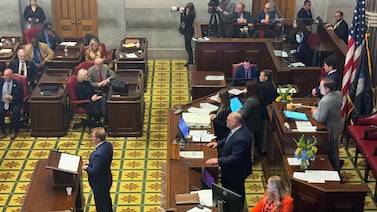Sign up for Chalkbeat New York’s free daily newsletter to keep up with NYC’s public schools.
New York City’s school bus workers have reached a tentative contract agreement with bus companies servicing thousands of routes — meaning a majority of families who could have been impacted by a strike will see uninterrupted bus services.
News of the agreement, which union officials and City Hall confirmed on Thursday, follows months of negotiation between the Amalgamated Transit Union and bus companies that contract with the city. New York City schools contract bus services with dozens of companies, and the union’s collective bargaining agreement with many bus companies expired at the end of June.
The tentative contract agreement, which secures services for thousands of bus routes that transport students to and from school each day, was first reported Wednesday night by the New York Daily News.
The terms of the contract must still be ratified by union members, according to union officials.
“We fought for the contract our members need and deserve to support themselves and their families, and so that there are enough skilled school bus workers to provide safe and reliable service to New York City families,” said Carolyn Rinaldi, chief of staff at ATU, in an emailed statement. “Our members are trained professionals. They are passionate and dedicated. Above all, they safely transport and attend to the most precious cargo in New York City — the children.”
The contract includes some guarantees on weeks of employment and medical coverage, as well as shorter progression to higher pay, among other things, according to the union.
Rima Izquierdo, an advocate and Bronx parent whose children take the bus to school, said she was grateful that a widespread strike appeared to have been avoided.
“That would have shut our city down,” she said. “And that would not have been good for anybody.”
What the contract agreement means for families
This year, some families returned to school as the potential strike fueled uncertainty over how their children would get to school. Though service continued as usual through the first few weeks of the school year, fear of future disruptions loomed.
Disruptions to school bus services disproportionately impact younger students, as well as students with disabilities and those who live in temporary housing.
The city’s Education Department previously estimated a strike would impact roughly 80,000 students across roughly 4,400 routes in the five boroughs, or more than half of the roughly 150,000 students who ride yellow buses during the school year.
About 25,000 of those affected would have been students with disabilities, officials said.
Now, a majority of those families should continue to receive services, though ongoing negotiations with the nonprofit school bus provider NYCSBUS and two other companies mean some families could still face strike-related disruptions, according to union officials.
“We are grateful that ATU Local 1181 and DOE-contracted school bus companies were able to come to a voluntary agreement,” a City Hall spokesperson said, adding it “will ensure continuity of service and peace of mind for the more than 80,000 students and their families who rely on these services, including thousands of students with disabilities.”
Why some families could still be affected by a strike
Negotiations with the remaining three bus companies could impact about 1,600 of the city’s more than 9,000 bus routes.
“That’s still a lot of kids,” said Lori Podvesker, director of disability and education policy at the non-profit INCLUDEnyc.
If each bus route carries even just 10 students, a strike would impact thousands of kids, Podvesker added.
“It’s really important if there is a strike, and in general, that there’s some kind of accountability system set up by the city that is school-based and keeps track of whether students miss services as a result of busing,” she said. “They need their services in order to access curriculum, and cumulatively, it builds up.”
Why families might see services disrupted without a strike
Even without a strike, some families may still experience issues with busing. The city’s vast school bus system often gets off to a rocky start, with families experiencing no-shows and long delays.
In a statement, Sara Catalinotto, the head of Parents to Improve School Transportation and a longtime transportation advocate, said her organization was “cautiously optimistic” that the settlement would include a wage structure that would help address staff shortages that lead to doubled-up bus routes that lengthen children’s commutes.
“A fair labor contract would be a step forward,” she said. “Much more is needed to repair the damage done by misplaced priorities and disconnected governance within NYC school busing.”
Izquierdo, the Bronx parent, remained concerned over the bus routes that could still be impacted as well as by the delays in bus service this year many have faced this year, including her own children.
“I feel like the least you can do for us is make sure our kids get to the building,” she said.
Julian Shen-Berro is a reporter covering New York City. Contact him at jshen-berro@chalkbeat.org.







